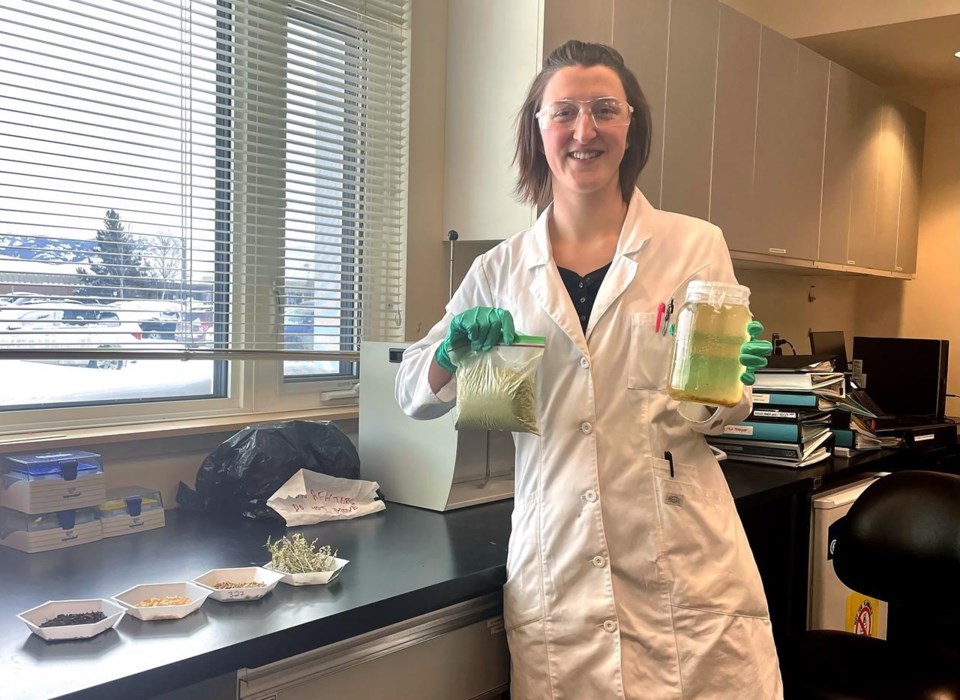A pesky invasive plant found in many areas of Yukon could be put to use helping clean contaminated water from mines, research suggests.
But the closure of Minto Mine, 240 kilometres north of Whitehorse, last summer means researchers have been stalled in their efforts to test what they found in a real world environment.
Master's degree student Taylor Belansky said a Sea-Can full of lab equipment for their pilot project remains on the site after the copper and gold mine was abandoned in May.
Belansky's work at Yukon University focused on bacteria that can remove nitrates from mine water by converting the contaminant into gas. But doing that most effectively depended on finding the right source of nutrients for the bacteria.
She said she tested food sources ranging from wood chips to waste from the local brewery but found that invasive white sweet clover helped to remove 99 per cent of nitrates from the water.
In practice, contaminated water would be pumped through long Plexiglas tubes containing both the bacteria and the clover. The water would flow at a rate allowing the bacteria enough time to consume the nitrates.
Belanskyfound this passive method of cleaning the water, using bacteria rather than filters or other forms of human management, was able to work in cold northern temperatures in a similar way to how it is already used in some southern projects.
"What we really had to do was make sure that we could use it and adapt the system to work in cold climates," she said.
"So, we did that by changing the amount of food that we gave (the bacteria) and also changing … how much time it took the water to pass through the system so the bacteria could be in contact with the contaminated water and have time to remediate it."
"Those are the two factors that we found we could manipulate to make sure that this treatment system worked in the cold."
Nitrates and nitrogen naturally exist in the environment, but activities like blasting at mines can release more into the environment and throw off the balance of an ecosystem.
Belansky said too many nitrates can cause algae blooms, impacting the oxygen levels in water and suffocating fish, as well as potentially affect drinking water.
She said Minto workers would have no problem finding white sweet clover, which grows across much of the territory, including near the mine
The Yukon Invasive Species Council warns that the plant "readily invades open areas and forest clearings as well as on river banks," pushing out other species and degrading natural grasslands.
"Mines are actually mandated to manage their invasive species on site. So, we would never want to be planting it intentionally, we wouldn't want to be spreading it in a way that would allow it to continue its invasion of the natural ecosystem," Belansky said.
"It's more like harvesting it, taking it out of the places where it's a problem, and kind of containing it in our treatment system."
Belansky said the pilot project would examine how the bacteria responds in the fluctuating temperatures in nature, how often the clover needs to be added to the soil, and whether it works better after being composted.
"The rest of the research team is hoping to be able to access the Minto site in the coming years, hopefully next year, to set up that pilot project and test the system in those conditions," she said.
The Yukon government controls entry to the site along with the Selkirk First Nation.
The Department of Energy Mines and Resources said in a statement that it appreciates the work researchers do to understand approaches to mine remediation.
"We plan to work with Yukon University and the Minto site operator to facilitate the continuation of this research," the statement said.
"We will be speaking with the university soon to better understand how this research could be done without conflicting with reclamation works happening on the site."
For now, Belansky said she's working on finishing her Master's thesis and waiting to get DNA tests back that will reveal exactly what type of bacteria is in Minto's soil. She then hopes to publish her findings.
The mine was put up for sale by a court-appointed receiver in August.
This report by The Canadian Press was first published Jan. 4, 2024
Ashley Joannou, The Canadian Press



